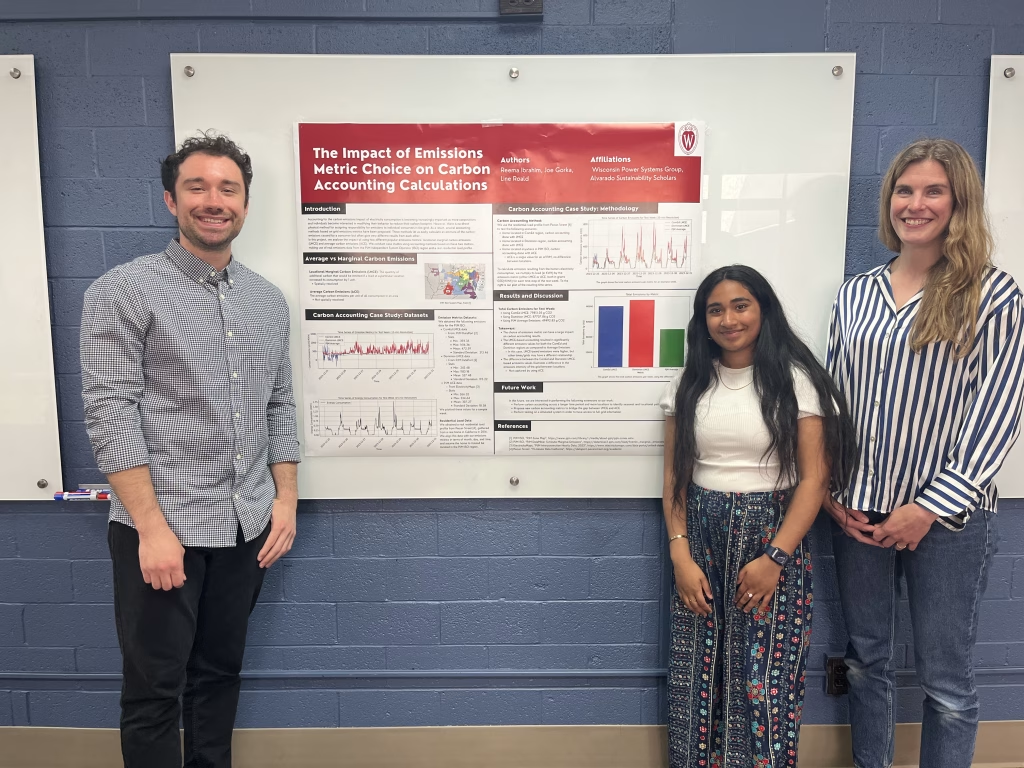Professor Emeritus Fernando Alvarado spent 30 years in the Department of Electrical and Computer Engineering at the University of Wisconsin-Madison, studying renewable energy, power systems pricing and computer applications in power systems. In retirement, he wanted to give back to the department—not just financially, but through a program that would directly serve students and the power engineering industry, while also advancing sustainability in the energy industry.
Finding the right project was difficult. Alvarado and his wife, Carla, kicked around a few ideas, but when the COVID-19 pandemic hit, they shelved the project for a few years. When Alvarado started discussions again, Associate Professor Line Roald suggested an idea that hit the mark. Roald said, “Why don’t we support undergraduate research and expose undergraduates to power engineering and teach them how it can help in sustainability?” and Alvarado replied, “It sounds like a great idea!”
The result is the Alvarado Sustainability Scholars, a program hosted by the Wisconsin Power Systems research group and organized by Roald. Principal investigators and graduate students participating in the program come up with well-defined research projects in energy and sustainability, that also often blend in skills from optimization, control and data science. Interested undergraduates apply for the projects and conduct their research with the guidance of graduate student mentors. In spring 2024, an inaugural class of six undergraduates participated in mentored research projects.
 PhD student Joe Gorka, undergraduate Reema Ibrahim and ECE Associate Professor Line Roald. Submitted photo.
PhD student Joe Gorka, undergraduate Reema Ibrahim and ECE Associate Professor Line Roald. Submitted photo.
While the basic idea of the program doesn’t seem too radical, Roald says it actually flips the traditional path to undergraduate research. In most cases, interested undergraduates must reach out to a professor to inquire about doing research. By instead offering a well-defined program with a clear application process, the program demystifies the pathway to undergraduate research for students and allows them to get up and running on a meaningful research project more quickly.
“The program helps us manage undergraduate research in a more formal way,” says Roald. “And during our first round, we got a whole bunch of applications from students who indicated that they might not have done direct outreach to researchers. We wanted to lower the barriers to getting involved in research.”
The program also gives graduate students valuable experience as mentors. Joe Gorka, a fourth-year PhD student, mentored Reema Ibrahim, a rising junior, on a project to calculate carbon emissions. “It was my first time mentoring an undergrad, and it was very helpful in developing the skills necessary to properly define the project,” he says. “The undergraduates in the program are very capable, but also very busy. So we have to think about what is realistic, and satisfying, for someone to learn in a semester. I learned a lot about setting the pace of the project as well—choosing a next step that wouldn’t just take 5 minutes, but also wouldn’t take 18 hours.”
Gorka and the other mentors seem to have found a good middle ground. The program’s first semester concluded with a poster session in which the six undergrads presented their research to Alvarado and other researchers. Alvarado says he was impressed by the work, and hopes the program continues to generate enthusiasm. “Everyone in ECE really got behind the idea. I was fascinated by the amount of interest generated among students. We’re going to have some really good power engineers coming out of this, and some people who would have never considered power engineering, which is really what we need,” he says.
Roald says that they have successfully recruited a new cohort of undergraduates to participate in fall 2025. This time around, instead of applying to tightly defined research projects, the students applied for research areas and will collaboratively develop their research interests with their mentors.
“I’m very happy how it turned out, and we had a really good semester,” says Roald. “In particular, I like how we are able to bring in students from across ECE—even those studying data science and computing and other fields. We want them to see how they can leverage the skills they have for energy and sustainability.”
Featured Image: Fernando Alvarado (third from left) and the first cohort of sustainability scholars: Caroline Murphy, Aayushi Singh, Eric Haag, James Towler, Reema Ibrahim and Sukriti Somvanshi. Submitted photo.